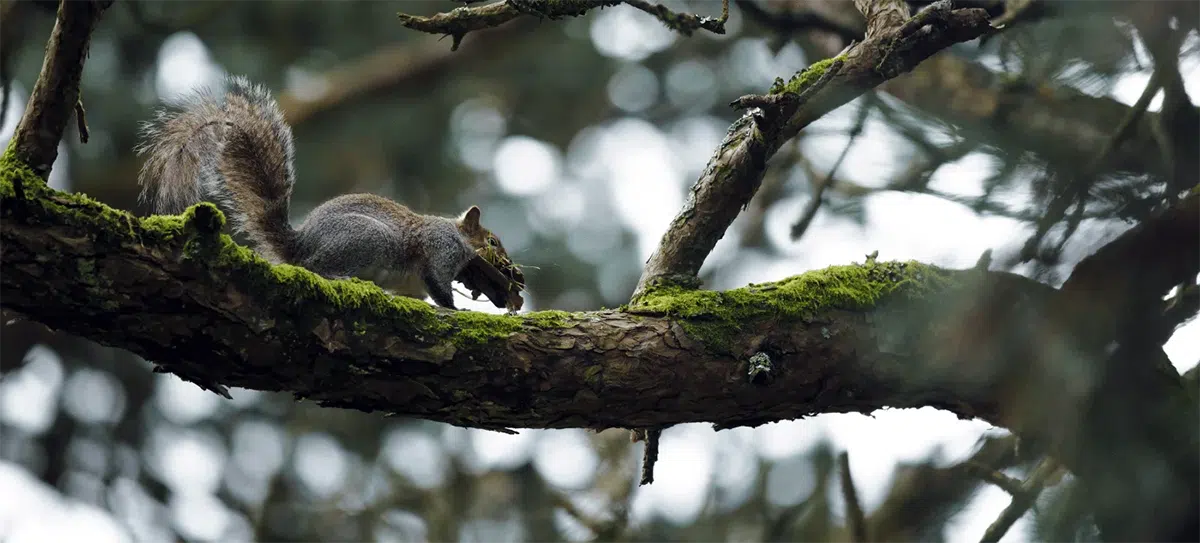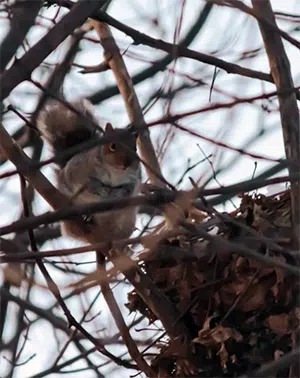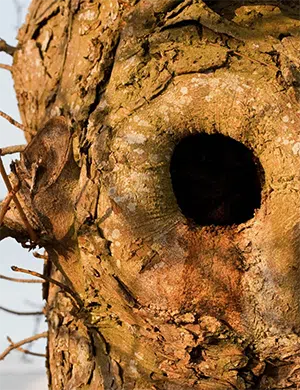Have you discovered the dwelling of an ever present, nimble little acrobat in your yard? You've got yourself your very own backyard squirrel - raider of bird feeders, annoyer of dogs, and just all around trouble maker? Before you get out the 30 foot extension ladder, let's see if it makes sense to remove or relocate a squirrel's den or nest.

When to Consider Relocating a Squirrel Nest
The 'when' here pertains to the reason it may be advisable to relocate a squirrel nest and/or the time of year to do so. Removing or relocating a squirrel drey or den is not nearly as easy as one may think.
Safety Concerns
To safely relocate a squirrel drey or den, it's important to verify
- Whether the nest is still in use
- Whether babies are present
 Because squirrels build their dreys (a drey is a leaf nest, usually placed in the fork of two branches) 20 feet or more up high in a tree, getting to it may pose significant danger in itself. And, if you do get to it and if the nest is still occupied, you'll likely come face to face with a pretty miffed squirrel, ready to defend his or her home. If your squirrly friend chose to set herself up in a tree cavity, you'd have that much harder of a time to locate the den AND you'd really be setting yourself up to get hurt if you try and evict from a single access point (and likely right in front of your face).
Because squirrels build their dreys (a drey is a leaf nest, usually placed in the fork of two branches) 20 feet or more up high in a tree, getting to it may pose significant danger in itself. And, if you do get to it and if the nest is still occupied, you'll likely come face to face with a pretty miffed squirrel, ready to defend his or her home. If your squirrly friend chose to set herself up in a tree cavity, you'd have that much harder of a time to locate the den AND you'd really be setting yourself up to get hurt if you try and evict from a single access point (and likely right in front of your face).
Severe Property Damage
If your friendly neighbourhood squirrel makes attempts at getting into YOUR home, it's time to get serious. Seeing damage to the corner strips of your siding is a good indication that a squirrel is slowly but surely chewing its way into your home. Shingle debris on the ground also points to a squirrel making its way into your attic. While small and cute, squirrels can leave a devastating trail of destruction in your home. From destroyed insulation to chewed wiring and potential fire hazards... you do need to put a stop to this as quickly as possible.
Immediate Danger to the Squirrels
Relocating a wildlife nesting site isn't always about wanting to get rid of them. You may have observed one of your own pets or other wildlife stalking your backyard guest and would rather not see him become lunch for another critter. Interesting fact: Did you know that squirrels can 'shed their tail' if necessary? It actually happens more often that you'd think. Finding a squirrel's tail on the ground may be a sign of your cat or dog 'almost' catching a squirrel. Unfortunately, squirrels cannot regrow their tail (after all, they're not lizards!) and their life expectancy diminishes drastically without a tail. The tail assissts in balancing, speed control when descending a tree, and it also helps with controlling body temperature.
When Not to Relocate a Squirrel Nest
Relocating a drey or den is about removing the reason for the squirrel to return, not to harm the animal(s). There are times when messing with their nest would be cruel and pretty much condemn them to perish.
During Breeding Season
While mum is getting ready to welcome her first of two litters this year, she will be aggressively defending her nest. This is pretty typical rodent nesting behavior. She hasn't spent countless hours over multiple days constructing the perfect home for her little family just to let you come and ruin it. She will attack you! Squirrels have exceedingly strong and sharp claws and teeth and can cause real injury. There's also the concern of disease. Squirrels are rodents and as such, they tend to carry Salmonellosis, Lyme disease, Leptospirosis, and Tularemia. Breeding season in Ontario is typically January-February and again in June-July.
 Presence of Baby Squirrels
Presence of Baby Squirrels
Please never ever remove a nest that has little ones in it. Knocking a drey with babies out of a tree, will surely kill them. Even carefully removing and relocating a nest may end up with mum abandoning her offpring - which will kill them. Before you attempt any nest removal or nest relocation, please be absolutely sure that you won't be harming the nest's occupants.
In The Dead of Winter
Winter dens or dreys are constructed differently than summer homes. They require a lot more insulation and architectural integrity to withstand harsh winters. They generally also contain an emergency food supply. Removing an active winter den may well sentence the resident squirrel to retreat to a much less suitable summer nesting site and greatly reduce its chances of survival.
Preventing Future Nesting
Let's say you have successfully removed a nest or three (squirrels often have more than one nesting site and keep reusing them) - how do you discourage an industrial mother squirrel from rebuilding in place?
Habitat Modification
Removing food sources and access is key. Trim back tree branches close to your house - and the roof, in particular. Have a good look at the route a squirrel may be travelling. From ground to fence to roof. Rake and clean up any fallen fruits or nuts and acorns you see on the ground - these are squirrel magnets! By modifying our yard, we create a less friendly or inviting squirrel habitat. Preventive measures are both kind and effective, respecting wildlife and its importance in our eco systems while also protecting our homes.
Exclusion Methods
Especially, if you have a high fence close to your roof line, you may want to consider something like Electric Shock Tracks to stop squirrels from running on your fence and using it as a way to get to your roof. They won't hurt the animal but do wonders for keeping squirrels and raccoons at bay. They can even be solar powered, making them an affordable yet effective solution. There are also some deterrents, both DYI and commercially available, that introduce predator smells and may signal to momma squirrel that this is an usafe location
The Safest Relocation Technique: Hawkeye Bird & Animal Control
To sum it up - Trying to relocate a squirrel nest, be it an arboreal nesting site or tree cavity nest, on your own in is a potentially dangerous endeavor. Both for you and the animal. The wildlife control experts at Hawkeye are much better suited to undertake this task safely and effectively. Contact Hawkeye today to discuss your squirrel or squirrel nest problem.














